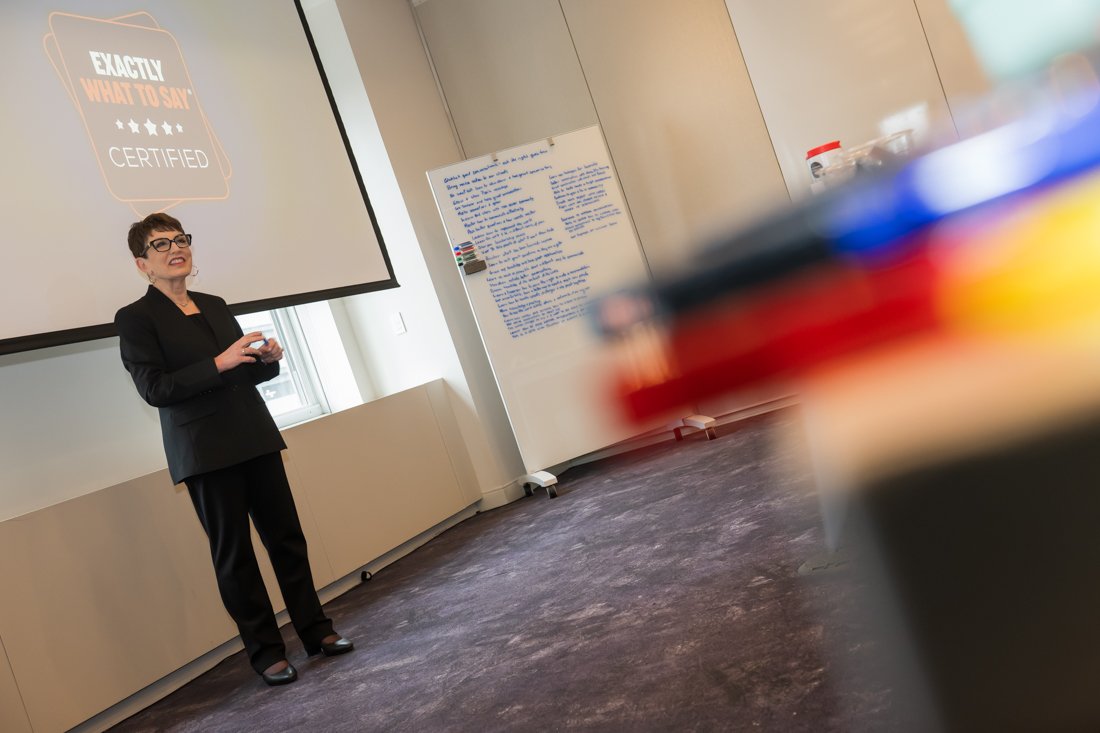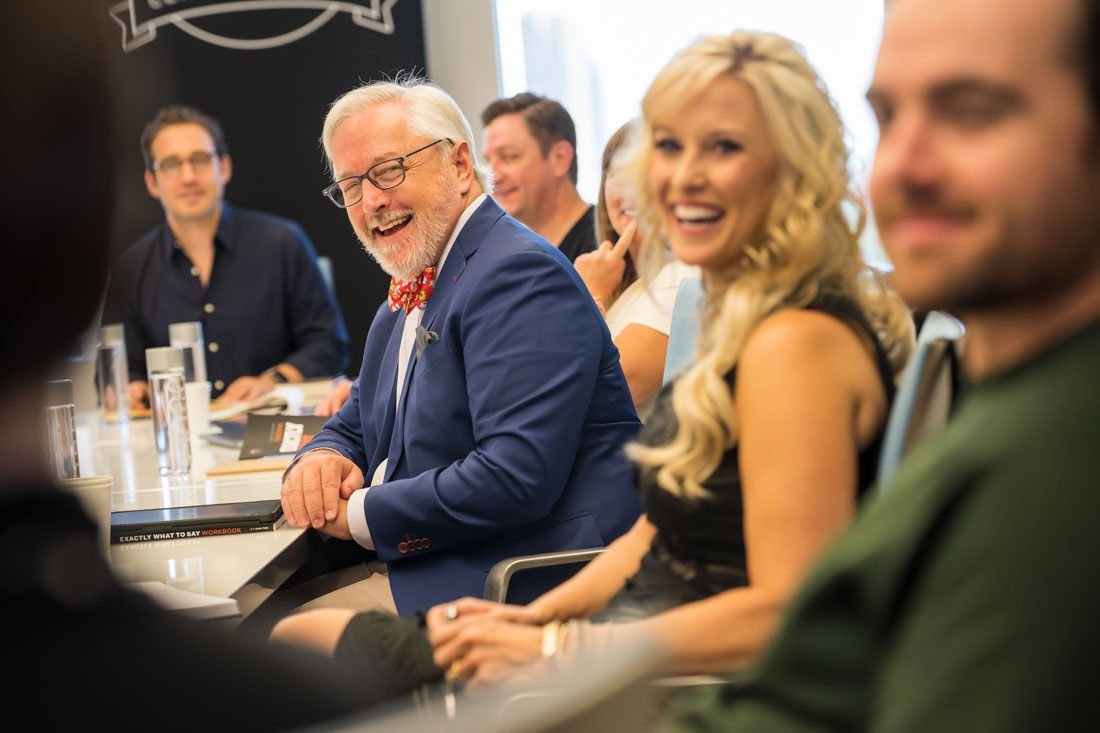The precise words that you use in given scenarios can have a massive effect on your sales results.
When you use the wrong words to give information or ask a question, you can immediately shut down your opportunity for a sale or prevent somebody from doing what you want them to.
In this blog, you’ll discover which exact words you should avoid using in all of your conversations and why they’re killing your success.
You’ll also learn the right words to replace them with so you can make sure that the simple language you’re using is serving you in the best possible way to guarantee positive results.
Why Your Words Matter
Did you know that often the difference between somebody choosing you, choosing somebody like you, or choosing to do absolutely nothing is quite simply down to the words that you use?
This is because your words have an impact on the emotional and cognitive response that happens to the brain of the person you’re speaking to. Your words have the power to decide their actions.
Which Words Matter
1
If
The word ‘if’ creates choice and choice isn’t always a good thing.
When you use the word ‘if’ in a sentence, it becomes a question. This gives people the option to decide whether they are in the camp or out of the camp. Whether they believe you or they don’t believe you or whether they’re thinking that it is something for them or whether it’s not something for them.
Using the word ‘if’ in your sales conversations creates a condition. It gives people a set of conditional circumstances where they stop to consider if they fall on that side or the other.
An example of this is when you say to somebody, “If you were to join my team…“
With this hypothetical scenario, the person you’re speaking to can decide if they can picture themselves joining your team or not.
You have a 50/50 chance that they’ll agree with you or disagree.
Most people don’t really want choices. Choices mean responsibility and responsibility can feel like pressure. So take the options away and give them the solution that you know will bring them success.
How do you do this? It’s so simple. Swap the word ‘if’ with ‘when’.
Instead of you saying, “If you were to join our team,” you say, “When you join our team”.
The person you’re talking to can’t help but picture themselves joining your team. When you can get somebody to picture themselves doing something, they’re much more likely to do it.
2
But
Do you remember receiving feedback sometime in your life from somebody you respected, and they said something along these lines; “You’re a really wonderful member of the team. We love everything that you do here but…”?
What did you remember about this conversation? It’s likely that you chose to remember everything that follows the ‘but’.
This is because the word ‘but’ cancels out everything that comes before it. Some people swap ‘but’ with ‘however’ but this is just a more polite or partial way of saying the word ‘but’.
If you swap the word ‘but’ for the word ‘and’, everything remains true and the whole sentence becomes valid rather than just the bit after the ‘but’.
So instead, you could say something like, “Look, I know that you’ll be great at this and I know that you’re really busy. I understand that it could be a challenge for you because of…”.
Watch your whole statements become inclusive, and you get more of what you want.
3
Cost
This word is a killer. When used in a sales conversation, the word ‘cost’ causes a massive challenge in getting people to move over the fence and take onboard the financial investment that you’re asking them to make.
Why should you eradicate the word ‘cost’ from your vocabulary?
Think about how you feel about the costs in your life? Are costs a good thing or a bad thing?
People view costs as a bad thing so when you label the money you’re asking somebody to spend with you as a cost, you’re calling it a bad thing.
The definition of cost is money out and nothing back. But if somebody is putting money in your pocket, you’re giving them something back, whether that’s time, a product, or an experience. This means that what you’re offering isn’t a cost to others but an investment.
Swap cost with investment and people will see the true value in what you’re asking them to do. None of us like to spend money on our costs, but we’re all proud to make investments. Change what you call it and it will change how people perceive it.
4
We
The word ‘we’ is often overused when people are trying to explain how good they are at what they do and how their company is the best at what it can be and why you should choose them. The issue with this is that people only really care about how this directly affects them.
So when you’re talking in terms of ‘we’, whose interests are you talking about? Is it your prospect, your customer, or your own? You’re talking in terms of your own interest but what you should be doing is talking in terms of their interest.
You can do this by shifting the positioning around whenever you see or use the word ‘we’.
For example, when you say things like, “We provide a comprehensive training program. We provide guarantees and services and warranties.” You’re talking about what you have. They are not receiving it.
Swap ‘we’ with ‘you’ and make it active. So instead of it being ‘what we offer’, move it towards, ‘choosing us means that you benefit from…’
This gets people to listen in and pay attention because you’re explaining how you can directly benefit them.
5
Expensive
“Wow! That sounds expensive.” is probably something you hear a lot from customers or prospects. When somebody believes something to be ‘expensive’, they’re not going to want to take action towards it. ‘Expensive’ is usually expressed to mean ‘too much’.
But just because you’re not the one saying it, it doesn’t mean that you can’t influence the use of it in your conversations.
The real meaning of ‘expensive’ is only a judgment based on comparison. Is a Rolls Royce expensive? You’d probably say yes and, compared to most of the Ford model range, it’s very expensive. But when compared to Bugatti, the Rolls Royce is actually kind of inexpensive.
Instead of calling something expensive, you can shift the language and change the word to ‘premium’. You do this by repeating back to the person who’s labeled something as expensive and you then talk about it as being a premium option.
Strangely enough, people love to pick the premium option when given the choice. In fact, recent statistics show that at least 20% of people go out of their way to choose a premium option when given the choice. Premium is worth the expense when there’s enough perceived value.
6
Cheap
Nobody wants to be associated with the word ‘cheap’. The negative connotations of this word are obvious. So what word can we replace ‘cheap’ with when talking about products or services that are less expensive?
Well, none of our offerings are ‘cheap’ because they are still good at what they do. In fact, what they deliver is great value.
If you consider the words most used in advertising by some of the major supermarkets, you’ll hear the word ‘value’ used over and over again. You can also use this word to describe something that provides a good service at a lower rate.
Your customers will be very satisfied because nobody wants to buy the cheapest thing, but they do want to get great value, and some people want to see a bigger return on their money.
One More For The Road
So there you have the 6 words that you need to steer clear of in conversations, particularly sales-related conversations! Simple swaps that will transform your results…
- ‘If’ should be changed to ‘when’.
- ‘But’ should now be ‘and’.
- ‘Cost’ is an ‘investment’.
- ‘We’ is now about ‘You’.
- ‘Expensive’ is better known as ‘premium’.
- ‘Cheap’ translates to ‘value’.
There’s one more word that crops up all of the time and really needs to be changed if you want to see success in all areas of your life.
The word ‘problem’.
What’s Your Problem?
If you often say things like, “Well, the problem I see with what you’re thinking,” “The problem with that as an idea,” “The problem with what you’re doing right now is…” You’re obviously focusing on other people’s problems. This is probably going to drive people away from you.
If you can swap the word 'problem' to the word 'challenge', you change the conversation from a head-to-head thing and turn it into something you can overcome side by side.
Calling things challenges also helps people to see that these things can be overcome. Problems tend to cause arguments whereas challenges can be worked on together.
These simple changes to your language will get more people thinking in the right kind of way to get you more of what you want.
To learn more about which words you can use to influence the behaviors and reactions of other people, read this blog ‘Exactly What Are Magic Words?‘
And please remember that with great power comes great responsibility. Always act with integrity and in the best interests of others.








